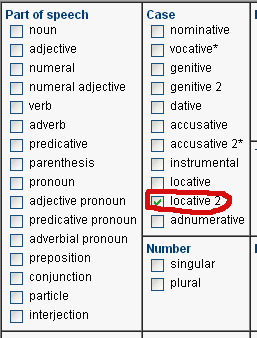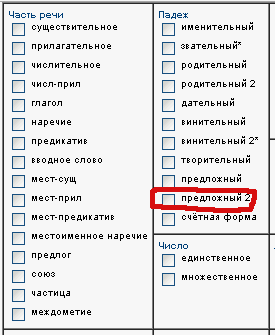It is not the real answer to the OP but rather a huge comment toI added some more examples of nouns ending with -у in the question. I'm tryingprepositional (aka locative) case to suggest here the algorithm of how to find allYellow Sky's answer (or almost allpending peer's review) such words. Problem is that I didThere are many more of them still not find the Zalizniak's dictionary in the electronic or online format whichmentioned.
In this answer I would be ablelike to search by grammatical marks. Maybeconcentrate on the phenomenon of such words, somebody fromfinding common patterns in them, and suggesting the community can help with thisways of finding them instead of just listing them. Kind of following the Chinese proverb: Give a man a fish and you feed him for a day. Teach a man to fish and you feed him for a lifetime. :-)
Common pattern
The phenomenon of havingI noticed that for all these words the ending -уfollowing is true:
- An old Russian word
- Single syllable, masculine gender, ending with consonant
- Used in the extended meaning of location inside of something
- Prepositional case is formed by taking the Dative case of the same word and moving the stress to the ending "-у".
Correct me if I'm wrong but I think in the Old Russian almost all the nouns had such form. With time these forms started to be supplanted by more modern forms of prepositional (locative) case forbut some words resisted and are still keeping their old forms in certain meanings. This my hypothesis is described atconfirmed by the fact that the words borrowed/created not very long time ago do not have such forms. F.e. compare мёд (old word) and йод (more new). It is possible to say выдержанный в меду, but it will be выдержанный в йоде - not йоду for йод.
The name of the phenomenon
According to Zalizniak's dictionary this phenomenon is called the "2-ой предложный падеж" (second prepositional case). SeeRussian National Corpus website calls it "предложный 2", or, in their English version: "locative 2". (Interesting is that locative - not prepositional - is used as the excerpt andtranslation of word предложный for grammatical cases. You can see the link"official" list of Russian grammatical cases by clicking "выбрать"/"select" close to the original scanned pages below"Грамм. признаки"/"Gramm. features" text box).
All these nounsthe words that can form locative 2 are marked with the sign П₂ in this dictionary.
If we look at one of online versions of Zaliznyak's dictionary for word "сад", here we can see that the word has the mark "п(2)"Zalizniak's dictionary.
See here, and here the original scanned pages.
How to find these words
One possibility is to open the online version of the Zalizniak's dictionary and scan it page by page searching for the mark "п(2)". (For example, look for word "сад" on the page references above). At least this is until a better (for our purposes) version of the online dictionary exists which would allow searching by marks. :-)
Another possibility for finding such words is by using the National Corpus. Click this; click on "select" close to "Gramm. features"; in the following popup check "locative 2".  ; on the main page click the "search" button. In the results of search you will see the words in locative 2 case put in the context of their usage.
; on the main page click the "search" button. In the results of search you will see the words in locative 2 case put in the context of their usage.
 ; on
; on on the main page click the "search" button. In the results of search you will see the words in locative 2 case put in the context of their usage.
on the main page click the "search" button. In the results of search you will see the words in locative 2 case put in the context of their usage.